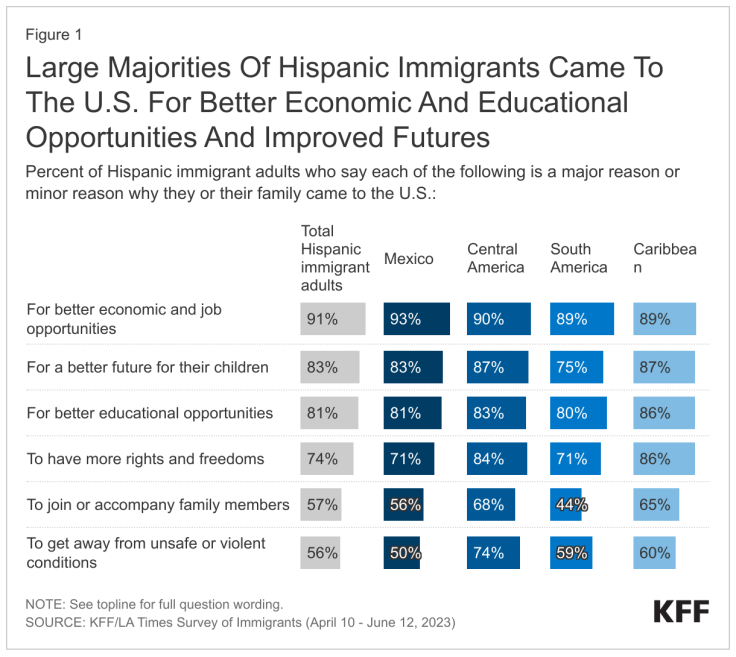
Many in the U.S. no longer believe the "American Dream," a notion that could be defined as "if you work hard you'll get ahead," holds true. However, for the vast majority of Latino immigrants, the country is still a beacon of economic hope.
According to a new poll by KFF, most Latinos decided to migrate to the United States for that reason, with 91% saying they did so for better economic and job opportunities, 83% for a better future for their children and 81% for better educational opportunities.
Once in the country, many still face socioeconomic challenges, but most feel they are better off as a result of immigrating, according to the study, with Central Americans being "especially likely to cite safety as a key benefit."
"Most Hispanic immigrants say they are better off than in the country of their birth when it comes to their educational opportunities (85%), their financial situation (82%), their employment situation (81%), and their safety (81%). About nine in ten Central American Hispanic immigrants (88%) say their safety has improved as a result of moving to the U.S., reflecting their reasons for coming to the U.S.," reads a passage of the study.

Moreover, eight in ten said they would migrate again if given the chance to go back in time knowing what they know now. "Overall, fewer than one in ten (7%) immigrants say they would not choose to move to the U.S. and about one in ten (13%) say they are not sure whether they would choose to move to the U.S.," the study says.
As for the economic situation in particular, two thirds are employed, including three-quarters of those aged 18-64. What's more, over a quarter are self-employed or own a business.
However, most (56%) live in lower income households (less than $40,000 per year). Fewer live in middle income (28% in $40K-$89,999) or higher income (13% in $90,000+) households, the study adds.
Despite not being among the country's most wealthy, most Latino immigrants say their standard of living is better than their parents' at their age and believe their children's will be better than theirs.
"Lower income Hispanic immigrants are as likely as those with higher household incomes to say their current standard of living is better than their parents' was and similar shares are optimistic about their own children's futures," the study says.
A factor for this could be lower needs to send remittances abroad as families settle in the U.S. About half of Latino immigrants send money over at least occasionally, even those from lower income households.
"Hispanic immigrants from Central America (62%) are more likely than those from South America (45%) or the Caribbean (46%) to say they send money at least occasionally. About half (53%) of Hispanic immigrants from Mexico send money at least sometimes. Hispanic immigrants with lower or moderate household incomes are more likely than those with higher household incomes to say they send money at least occasionally (53% vs. 58% vs. 38%)," according to the study.
© 2025 Latin Times. All rights reserved. Do not reproduce without permission.





